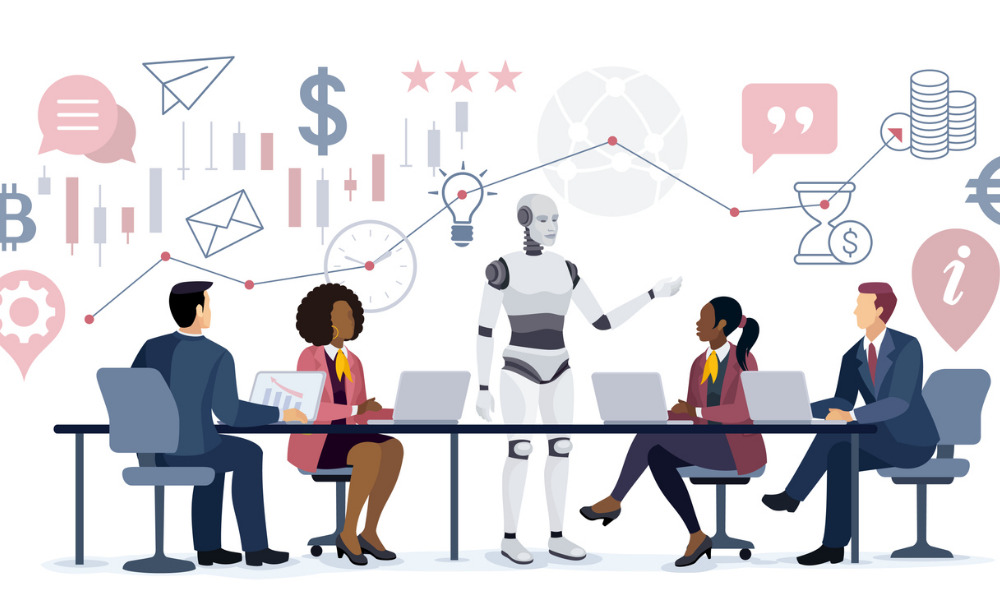
This signals an exciting possibility, one where people skills become more essential

Global networking platform LinkedIn has reached a major milestone, and recently hit one billion members. From the one billion professionals and 67 million companies on the platform, LinkedIn has distilled various labour market insights.
LinkedIn’s latest Future of Work – AI at Work Report finds that AI is already starting to change how we work, and in the coming years AI is also going to change the very definition of work. Generative AI is at the forefront of the future of work transformation.
The report finds conversations around AI on LinkedIn have skyrocketed, rising by 70% globally as of September 2023 – and with this in mind, LinkedIn says there is a ‘significant opportunity’ for it to leverage its latest AI innovations, and to help professionals navigate the future of work.
LinkedIn’s data predicts that by 2030, the skills required for many jobs will change by at least 65%.
LinkedIn is already starting to see that play out as the demand and supply for workers with AI skills has increased.
The report found there’s been an 11% rise in applications to AI and AI-related job postings globally, the hunt is also on for AI-skilled talent. The figure is even higher in Australia (16%), and sectors with the greatest need for AI talent include professional services, administrative and support services, and government administration.
The trend is consistent across APAC, in South East Asia job posts mentioning AI or Generative AI have doubled (2.4x) and applications to these jobs have grown by 1.7x over the last two years.
LinkedIn members are clearly responding to this heightened demand, as LinkedIn has already seen an almost 80% increase in members learning AI-related courses this quarter and LinkedIn data shows a 65% increase in learning hours spent on LinkedIn Learning's GAI/AI courses since 2022. LinkedIn notes that the future of work is quickly becoming intertwined with the future of learning, and as demand for AI skills rises, learning is likely to become more flexible and accessible.
Looking ahead, LinkedIn expects AI to accelerate learning and upskilling. In addition to AI-related skills, soft skills such as communication, emotional intelligence and problem solving are also becoming increasingly important.
According to LinkedIn’s CEO, Ryan Roslansky, “This signals an exciting possibility, one where people skills become more essential to individual success and where people-to-people collaboration becomes more essential to company success.
“Those who will be the most successful in jobs in the age of AI are going to be the agile ones that embrace growth as a virtuous cycle: your growth, through learning and development, fuels company growth while company growth, through innovations in business strategies and cross-functional collaboration, fuels your growth.”
LinkedIn’s data shows across all countries in APAC, we see that LinkedIn Learners are picking up as many soft skills as hard skills.
In Australia, communication skills were among the most prevalent in members’ learning. Top skills included Speaking Confidently and Effectively, How to Speak So People Want to Listen and Project Management Foundations. Excel skills were also highly requested, most notably Excel Essential Training (Microsoft 365) and Excel Quick Tips (2020).
Singapore also saw a high take-up of communication and Excel-focused programmes, alongside Strategic Thinking (2017) and What is Generative AI?
Communication and Excel skills were popular in Indonesia, where members were also interested in Coaching and Developing Employees (2019), Learning Data Analytics: 1 Foundations and Cultivating a Growth Mindset.
We’ve all heard about AI boosting efficiency, but it is far from just an automation tool.
AI can be a tool that breaks language, cultural and knowledge barriers – a promising trend for diversity and inclusion especially amongst companies looking to expand their global footprint.
For example, in the APAC region, the share of new companies with APAC-located headquarters has grown by 22% in the last ten years (2014 – 2023).
The workforce is also evolving with the arrival of Gen Z, who are bringing a new set of ideas values. LinkedIn highlights that companies who embrace flexibility, engagement and technology will thrive in retaining young talent – something they’ll certainly need, as Gen Z workers are 2.4 times more interested in acquiring AI skills than baby boomers in Australia. Companies that invest in AI will keep this generation engaged.
Looking ahead, there’s no doubt that AI will continue to underpin the massive changes happening in the workforce. LinkedIn’s primary focus will be to leverage its latest AI innovations and perfect its AI-powered tools for members – including recruiters, marketers and professionals.
Last month, it rolled out the following tools to help HR pros to save time and drive efficiency in their roles:
To get more insights into global AI trends, download LinkedIn’s Global Future of Work Report or read How LinkedIn’s top AI courses Can Shape Your Organisation's Upskilling Strategy.
Get LinkedIn to assess your business needs and recommend the products to help you achieve your goals.